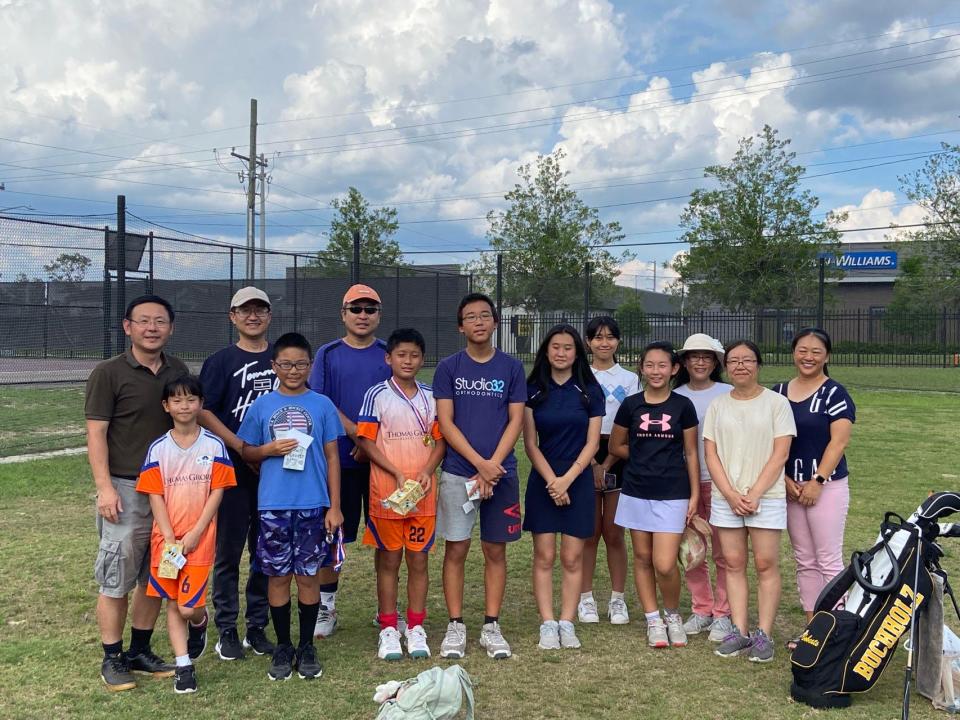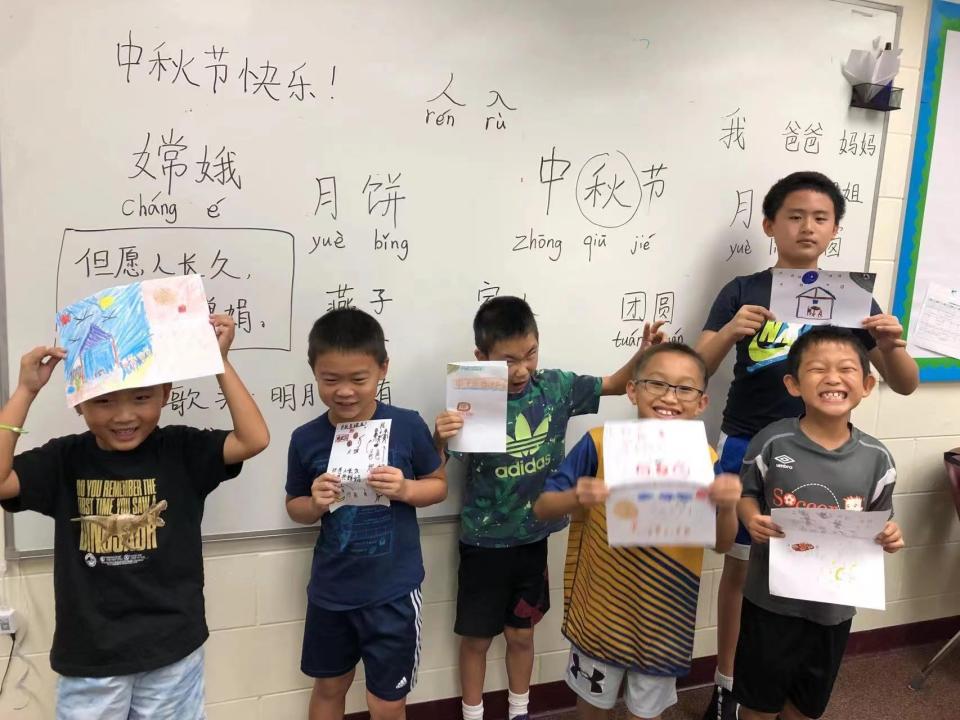Caught in the middle: Chinese scholars targeted by new Florida laws that take aim at China
- Oops!Something went wrong.Please try again later.
Yao Dai fled from the cold weather of Ann Arbor, Michigan, to the Sunshine State in 2008 in pursuit of the American Dream that led him and his wife, Min Zhang, to leave their homes in Beijing, China, years before.
Dai discovered Florida’s sunny beaches, calm living and future home on a trip to Orlando, Miami and Key West in 2008. In love, the couple moved to Gainesville six months later. There they bought a house, have happily raised their two American-born Chinese children, and made the community their permanent home.
On most days Dai prefers to ignore one aspect of living in Florida, choosing to not pay too much attention to the often polarizing politics that grip the state. Instead, he focuses on teaching a group of about 150 school-age kids how to speak Mandarin Chinese as principal of the Huagen Chinese School in Gainesville.
Now in court: Chinese Floridians, real estate company sue over DeSantis' foreign land ownership law
Context: Chinese influence bill passes Legislature, signed by DeSantis, despite discrimination concerns

But lately, political chatter has become harder to ignore, and Dai can see that some parents at the school are concerned about being caught in the crossfire of new Florida laws aimed at curbing the influence of the Chinese Communist Party on the state.
“I personally tend to avoid political things, because politics are complicated,” Dai said. “In terms of emotions, because we are Chinese, China is our mother country so we are really kind of in a catch 22, and have some conflict standing in between.”
Florida laws take aim at Chinese government influence
Two new Florida laws preventing Chinese nationals from purchasing property in the state, and prohibiting partnerships between universities and colleges with programs that have ties to the Chinese Communist Party, went into effect July 1.
Gov. Ron DeSantis on July 31 touted Florida’s new laws that prevent the purchase of land by members of the Chinese Communist Party, while he unveiled a tough-on-China economic plan if elected president. The laws also address the potential for influence by the Chinese government on the education system.
He promised further action if elected president, such as putting an end to preferential China’s trade status..
"China has become more authoritarian, more powerful, and more ambitious," DeSantis said. "We’ve seen our relationship marred by the theft of our intellectual property. Trade dumping. Currency manipulation, and espionage."
“The abusive relationship, the asymmetric relationship between our two countries must come to an end," he said. "No more massive trade deficits. No more importing of goods with stolen intellectual property, no more preferential trade status. We need to incentivize the repatriation of American capital and investment here in the United States."
One law, SB 264, prohibits foreign nationals from seven countries of concern – China, Russia, Iran, North Korea, Cuba, Venezuela and Syria – from owning property located within 10 miles of any military installation or critical infrastructure in the state. It also prohibits the purchase of agricultural land.
A foreign national who purchases property, and persons selling the property to them, commit a second degree misdemeanor, punishable with up to 60 days in prison and a $500 fine.
But the law goes one step further when it comes to nationals of the People’s Republic of China, and denies them the ability to purchase property in Florida entirely. It also imposes harsher punishments specifically on Chinese nationals who violate the law.
They are subject to a third degree felony punishable with up to five years in prison and a $5,000 fine. Those who sell the property to Chinese nationals could be charged with a first degree misdemeanor, punishable by up to one year in prison and a $1,000 fine.
Anyone who already owns such property may continue to do so, but must register with the Department of Economic Opportunity or be subject to a $1,000 per day fine.
Immigration: 'What are we going to do?' Two migrants share fears for the future in Florida crackdown
More: New immigration law sparks fear and worker exodus from Florida
The law does allow persons with a verified immigrant U.S. Visa or who has been granted asylum in the U.S. to purchase one residential property no larger than two acres in size provided that it is not located within five miles of any military installation. The exemption does not apply to travel-only Visas.
The law is being challenged in court — where the U.S. Department of Justice submitted a Statement of Interest in court stating that the United States considers SB 264 a violation of the 14th amendment of the constitution.
Another law, SB 846, prohibits state universities and colleges from accepting any grants from or forming agreements with the seven foreign countries of concern. Research and academic collaboration agreements are prohibited as of July 1, and prohibitions on partnerships such as student exchange, study abroad, recruitment and dual degree programs go into effect Dec. 1.
History of concern at universities
Concern about the Chinese government’s influence on American universities can be traced back to at least 2014, when the American Association of University Professors published a report raising concern over possible Chinese Communist Party influence on the education system through Confucius Institutes. There were about 90 American and Canadian universities that hosted the institutes at the time, according to the report, although many have closed.
Sen. Marco Rubio drew attention to the matter in 2018, when he sent letters to Miami Dade College, the University of North Florida, the University of South Florida, the University of West Florida and Cypress Bay High School asking them to terminate their agreements with Confucius Institutes. All six schools complied by the end of 2019.
Although the University of Central Florida was not among those schools, the university has closed four cases since 2016 where researchers were found to have ties to the Chinese government. One was terminated and three others resigned. The most notable case is that of Dr. Zinzhang Wu, who resigned only with handwritten notice delivered by his wife to the university and fled the country in 2018.
In February 2021 a researcher at the University of Florida was indicted for fraudulently obtaining $1.75 million in federal grant funds from the National Institutes of Health by concealing support from the Chinese government and a company he founded in China to profit from that research.
Rubio stepped into the debate once again in early June and introduced a bill in the U.S. Congress that prohibits U.S. Department of Defense funding for colleges that host Confucius Institutes. It is meant to counter creation of a waiver program to approve or deny Confucius Institutes by the DoD earlier this year.
"Confucius Institutes, which are directed by Beijing, have plagued college campuses in our nation with the CCP's propaganda,” Rubio said in a press release issued on June 7. “There is no reason why the DoD should support these institutes.”
Chasing the American Dream

In Gainesville, where no Confucius Institute has ever existed, it’s many of the parents who have children enrolled at the Huagen Chinese School who are among the most affected.
There is no idyllic school house – instead they rent space from the Oak Hall School – but a group of about 20 teachers, 30 parent volunteers, and 150 cheerful kids make the most of four hours every Sunday afternoon.
“Gainesville is a campus town,” said Dai, who volunteers his time as principal of the Huagen Chinese School. “That’s why more than 80 percent of the Chinese school parents are faculty or medical professionals from the university and affiliated hospital.”
“They are highly educated,” he said. “So lots of parents are working as volunteers for our school. Not only myself, but we also have a whole committee which has around 12 parents. We are working for free, but our goal is just to make sure the school is running smoothly because it benefits everybody.”
“But I can tell some of our Chinese School parents, they are still graduate students with F-1 Visas, which is an international student,” he said. “And some of them have visiting scholar Visas, which is a J-1 Visa. Those are the populations that are most affected.”
A former scholar himself, Dai immigrated from China in 2008 at the age of 29 to work as a staff scientist at the University of Michigan.
“I stayed there for two years and a half and worked as a staff scientist at UMich,” Dai said. “It’s too cold in An Arbor, so my wife doesn’t like the weather, that’s why we looked around to find a warmer place. Eventually we liked Florida.”
Once in Gainesville, Dai continued his work as a staff scientist at the University of Florida. In 2014 he earned a green card and began the process of changing careers, another step in his pursuit of the American dream. In 2021 he committed full time to his business offering financial consulting for immigrant families learning how to pay taxes or manage finances in the U.S.
“After I got my green card I decided to switch my career here,” he said. “So now I have my own business right now, so I am no longer working at the university, because I like the American Dream and I like the flexibility.”
Dai says he understands consternation about the Chinese Communist Party’s influence, and conflict between the two countries. He even understood when politicians started to use the word “China virus or Wuhan virus” to describe COVID-19.
He said he felt caught in the middle of a conflict between two cultures.
“I think some of the Confucius Institutes, they say, have some type of political purpose,” Dai said. “I can understand why the U.S. government would want to abandon that.”
“But it is a little bit of a sensitive subject because it’s going to limit opportunities for international students to come to the U.S.,” he said. “I feel like it’s not good to block their opportunities, I think we should provide talented graduate students more opportunities to come to the U.S. to learn."
"But on the other hand I personally understand why they are getting more strict," he said. "I understand, but it doesn’t mean I fully agree with it.”
This article originally appeared on Sarasota Herald-Tribune: Chinese scholars targeted by new Florida laws that take aim at China

